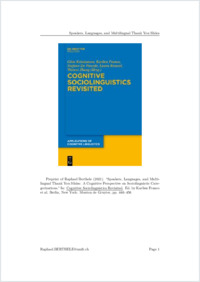Speakers, languages, and multilingual thank you slides: A cognitive perspective on sociolinguistic categorizations
BLE-BLL
- Berthele, Raphael ORCID Université de Fribourg
- 2021
Published in:
- Cognitive Sociolinguistics Revisited / Gitte Kristiansen ; Karlien Franco ; Stefano De Pascale ; Laura Rosseel ; Weiwei Zhang. - 2021, p. 446-456
Linguistic diversity
Multilingualism
Categorization
Linguistic justice
Cognitive linguistics
Sociolinguistics
English
Linguists enjoy debating the value and legitimacy of metalinguistic categories such as names for languages and varieties (Ebonics, Tussentaal, Macedonian), labels for speaker’s languages (mother tongue, first and heritage languages), and categories of speakers (native speaker, second language speaker, bilingual). The linguistic domain of inquiry is intrinsically variable. Understand ably, therefore, debates on the best way of referring to languages and speakers take up a lot of energy in the field. Due to unresolved linguistic and sociological problems, these debates do not sustainably advance our scholarly thinking. The well-intentioned terminological innovation on the metalinguistic level only produces short-lived solutions to the problem because of fallacious presuppositions on the nature of fit between categories and linguistic patterns of use. A better conceptual grip on the (unavoidable) human tendency to model and categorize the natural and cultural/social world is required. This can be achieved by taking more seriously fundamental ideas of cognitive semantics. Moreover, I argue linguists should be far more cautious when making claims about the effects of their declarations on social inequalities.
- Faculty
- Faculté des lettres et des sciences humaines
- Department
- Département de plurilinguisme et didactique des langues étrangères
- Language
-
- English
- Classification
- Language, linguistics
- Other electronic version
- License
-
Rights reserved
- Identifiers
- Persistent URL
- https://folia.unifr.ch/unifr/documents/309663
Statistics
Document views: 263
File downloads:
- berthele_crc_preprint_2021: 327
